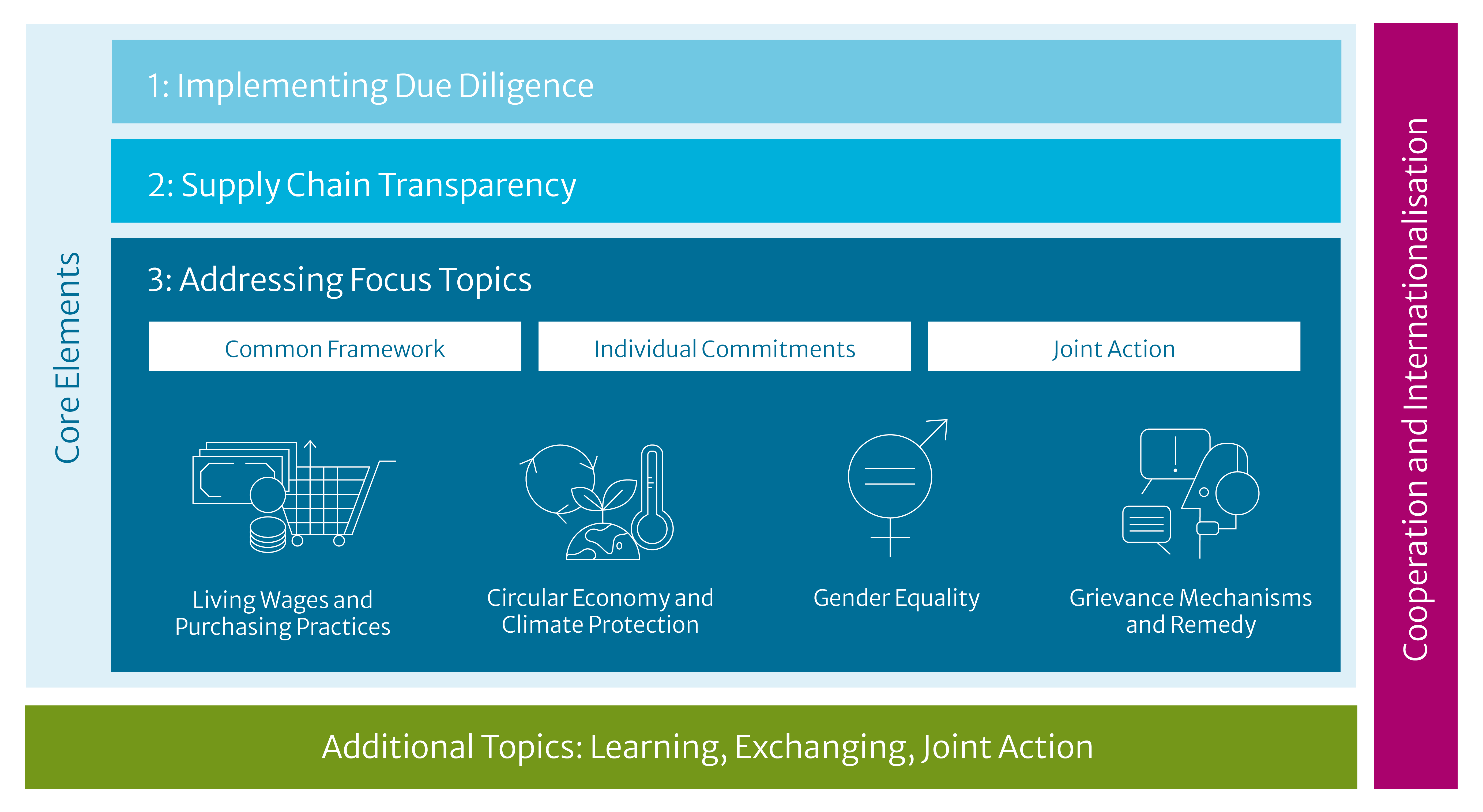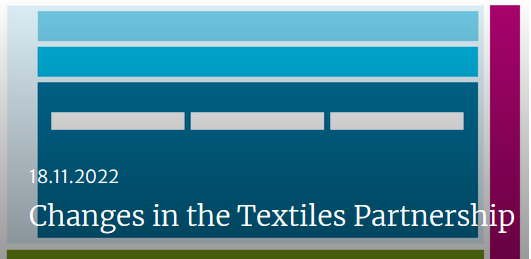Chapter 3
Textiles Partnership 2023
Due diligence, transparency and focus topics
Realignment
In recent years, the textile and garment sector and its environment have undergone significant change. Statutory regulation is also increasing, mandating companies to show greater commitment to sustainability and compliance with social and environmental due diligence requirements, including the Supply Chain Act in Germany. In addition, the EU launched a number of regulatory measures under the umbrella of the EU Green Deal. These have the potential to bring about major changes and new requirements for companies, consumers and producer countries alike.
Moreover, COVID-19 was still having an impact in 2022 and human rights violations continued in various countries such as China and Myanmar. Moreover, came Russia’s aggression against Ukraine and the associated rise in energy costs and inflation. In the face of multiple crises, 2022 was a challenging year that brought great uncertainty and high levels of stress – for the economy, for politics and for people worldwide.
In 2022, the Partnership for Sustainable Textiles set out its course for the years ahead, responding not only to the shifting framework but also taking measures to boost its own efficiency. From now on, Textiles Partnership activities will focus on three core elements.
Core element 1 involves companies making individual commitments to implementing due diligence and to transparent reporting on the implementation status. A prerequisite for this is knowledge of one’s own supply network, which is addressed in core element 2. Core element 3 looks at ways to effectively address four focus topics, so that capacity and resources can be pooled, and greater impact achieved.


‘This realignment has a clear objective: our aim is to contribute to the shift towards a more sustainable and responsible textile and garment sector and to support our members in the best way possible. It remains important for us to be accountable for the implementation of due diligence. But we avoid double reporting because we now also recognise other formats. All member companies are now required to publish their suppliers – this is how we promote industry-wide transparency. It will be easier to measure our progress thanks to the four focus topics and we’re moving more rapidly towards launching projects at the local level.’
Linda Schraml, head of the Partnership Secretariat
Here we provide an overview of the most significant changes. You can find more information in the news article about our realignment:
News
Due diligence, transparency and focus topics
In its meeting on 28 September 2022, the Steering Committee adopted a new concept for the Partnership for Sustainable Textiles. In the future, the Partnership’s work will focus on three basic elements.


Implementing due diligence
Reporting on the implementation of due diligence remains important core element 1. Member companies can continue to use the Partnership’s own review process, with data entry in TexPerT, and the assessment meeting. One new feature here is that other formats are now also recognised as evidence. Currently, these formats are reporting to BAFA in line with the German Supply Chain Act and audits for Green Button 2.0.
Supply chain transparency
All member companies provide the Partnership Secretariat annually with a list of their suppliers, in particular their sewing and RMG factories (Tier 1). All suppliers are aggregated into a list and published via the Open Supply Hub (formerly Open Apparel Registry). Participation in the aggregated PST list, which was voluntary until now, will now be mandatory. This is how the Textiles Partnership and its members are promoting transparency in the industry.
Addressing focus topics
Living wages and purchasing practices, circular economy and climate protection, gender equality, grievance mechanisms and remedy – these four focus topics reflect the challenges faced by the textile sector. At the same time, there is great leverage for improvement through joint action in the Textiles Partnership and with partner organisations.
A common framework based on international guidelines and recommendations exists for all four focus topics. This sets out the objectives pursued by the Textiles Partnership. Supplementing these are the ‘individual commitments’ made by member companies. Using standardised indicators, each member can measure its individual progress with the focus topics, while the Textiles Partnership measures progress in aggregate. And members implement joint projects in producing countries on all focus topics. These projects make a measurable contribution to the focus topics as well as towards individual indicators.